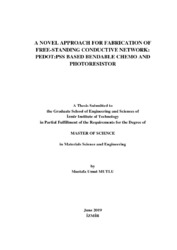Please use this identifier to cite or link to this item:
https://hdl.handle.net/11147/7377| Title: | A Novel Approach for Fabrication of Free-Standing Conductive Network: Pedot: Pss Based Bendable Chemo and Photoresistor | Other Titles: | Bağımsız İletken Ağ Üretimi için Yeni Bir Yaklaşım: Pedot:pss Tabanlı Bükülebilir Kemo ve Foto Direnç | Authors: | Mutlu, Mustafa Umut | Advisors: | Yıldız, Ümit Hakan Demir, Mustafa Muammer |
Keywords: | Electrospinning Biosensors Conducting polymers Composite polymers PEDOT:PSS MWCNT |
Publisher: | Izmir Institute of Technology | Source: | Mutlu, M. U. (2019). A novel approach for fabrication of free-standing conductive network: PEDOT: PSS based bendable chemo and photoresistor. Unpublished master's thesis, İzmir Institute of Technology, İzmir, Turkey | Abstract: | Electrospinning is a simple and versatile technique for the fabrication of polymeric nanofibrous substrate with high surface to volume ratio. Besides high surface to volume ratio, their dimensional stability and flexibility make it a perfect candidate for conductive network for various sensor applications. Free-Standing conductive network can be fabricated by deposition of PEDOT:PSS or MWCNT through bendable nanofibrous substrate. As a simple example for sensor applications, the moving object has been sensed through the electrostatic interactions between fibers and object. The sensing range has been found to be 1-5 cm above the surface of fabric. By the controlled combination of conductive polymers and electrospun polymer nanofibers effective device miniaturization has been provided without loss of performance. The noncontact motion sensor platform has unique flexibility and light weight holding a potential for wearable sensor technology. For another application as a wearable electronics, the controlled combination of conductive network and light-matter interaction provides opportunities to fabricate photo-resistor exhibits broad band response 400 to 1600 nm that holding promises for ultra-thin sensors used in telecommunication. As a final example, we report the effect of gold and iron oxide nanoparticles on the selectivity and sensitivity of MWCNT or PEDOT:PSS based chemiresistor responsive to VOCs. The interplay between conductive layer by gold and iron oxide nanoparticles resulted a significant conductivity improvement that affecting selectivity which is governed by the interaction between electron-donating VOCs and NP doped conductive layer due to variation in charge carrier densities in conductive layer lattice. Elektroeğirme, çap ölçüleri nanometreden mikrometreye kadar değişebilen polimerik lif üretiminde kullanılan basit ve çok yönlü bir yöntemdir. Son derece küçük çap ölçüleri nedeniyle, yüksek yüzey/hacim oranına sahip olan elektroeğirme nanolifler, aynı zamanda yapısal olarak sağlam ve esnek yapılardır. Bu özelliklerine bağlı olarak, elektroeğirme yöntemi ile üretilen nanolifler, birçok bükülebilir sensör uygulamaları için önemli bir adaydır. Elektroeğirme ile üretilen bükülebilir nanoliflerin üzerine PEDOT:PSS veya MWCNT ile modifiye ederek bağımsız iletken ağı üretmek mümkündür. Sensör uygulamalarına örnek olarak, yapılan çalışmalar ile sensör yüzeyinin üstünde hareket eden objenin algılanabildiği gözlemlenmiştir. Objenin algılanması, sensör ile nesne arasındaki elektrostatik etkileşimler sayesinde olmaktadır. Bu sayede 1 – 5 cm mesafedeki nesneler algılanabilir. İletken polimer ve nanoliflerin birleşimi ile dengeli iletken ağ oluşturarak performans kaybı olmadan ufak boyutlu sensör üretilebilir. Üretilen sensör, hafifliği ve esnekliği ile giyilebilir elektronik uygulamalarında kullanılabilir. Uygulanan bir başka giyilebilir elektronik örneğinde, telekomünikasyon sektöründe kullanılabilecek iletken ağın ışık ile etkileşimi sayesinde 400 – 1600 nm aralığındaki dalga boylarını algılayabilen foto direnç üretilebilir. Son olarak, demir ve altın nano parçacıkların uçucu organik bileşiklerin tayininde seçiciliğe ve hassasiyetine etkileri araştırıldı. İletken ağ ile nano parçacıkların etkileşimi sensörün iletkenliğini arttırarak organik uçucu gaz seçiciliğini etkilemekte. Organik uçucu gaz seçiciliği ise elektron veren organik uçucu gazlar ile nano parçacık ile katkılanmış iletken ağın etkileşimlerinden kaynaklanmaktadır. |
Description: | Thesis (Master)--Izmir Institute of Technology, Materials Science and Engineering, Izmir, 2019 Includes bibliographical references (leaves: 46-47) Text in English; Abstract: Turkish and English |
URI: | https://hdl.handle.net/11147/7377 |
| Appears in Collections: | Master Degree / Yüksek Lisans Tezleri |
Files in This Item:
| File | Description | Size | Format | |
|---|---|---|---|---|
| T001995.pdf | MasterThesis | 2.79 MB | Adobe PDF |  View/Open |
CORE Recommender
Page view(s)
338
checked on Apr 21, 2025
Download(s)
586
checked on Apr 21, 2025
Google ScholarTM
Check
Items in GCRIS Repository are protected by copyright, with all rights reserved, unless otherwise indicated.